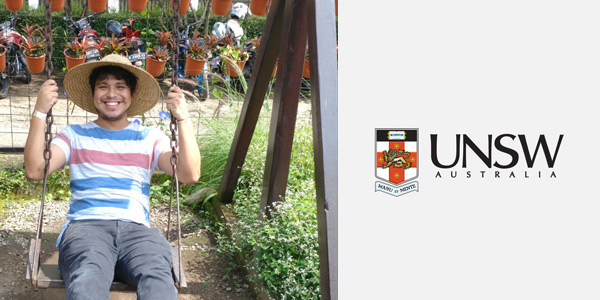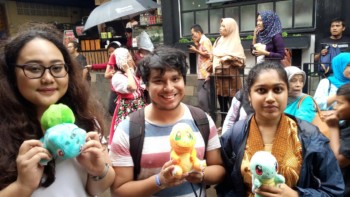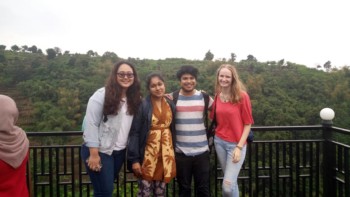
Alexis Castro Robles is a 2017 New Colombo Plan Mobility Grant recipient from UNSW Australia. Alexis completed the International Relations Program at Parahyangan Catholic University, Bandung in August-December 2017.
Q: Why did you decide to undertake the ACICIS program?
My main interests within my International Relations major are Postcolonialism, alternative views to Eurocentrism and the ‘Global South’, so I believed that the ACICIS Program would give me a fantastic opportunity to experience my studies in a vibrant place like Bandung. This was where the Asia-Africa conference was held in 1955!
Q: What classes are you currently enrolled in?
- Indonesian Foreign Policy – Explores the evolution of Indonesia’s foreign policy since 1945 to the present.
- Bahasa Indonesia (Pre-Basic): Introductory lessons on Indonesian language.
- Regionalism in Africa – Provides a deep understanding of the social, economic, political and security changes in Africa since decolonisation.
- International Politics – Discusses political theories and analyses the Global International system.
- International Organisations – About the theory, role, functions, development and challenges of International Organisations.
- Community Development – Looking at how community development skills can bring significant positive changes to a local community.
- UNPAR Management Internship – An opportunity to undertake an internship in Bandung.
Q: Are you involved in any clubs/societies at the university?
I was involved with UNPAR Radio Station for some time, however, since beginning my internship, I have prioritised the latter. Despite this, I have managed to volunteer a few hours a week teaching English at St. Angela Middle School to Year 8 students.
Q: How will the International Relations Program influence your future career or study?
It will give me the international edge necessary for a career in research, government or an international NGO that I may choose to apply for in the future. Studying International Relations through an Indonesian lens has broadened my understanding of both the discipline and my place in the world as a global citizen.
Q: How does studying International Relations from an Indonesian perspective differ to International Relations from an Australian perspective?
My home university (UNSW) pioneers a critical approach to the Eurocentric foundation of International Relations and concentrates on alternative and critical theories stemming from Feminism, Post-colonialism, Green theory and critical constructivism etc. However, UNPAR differs greatly in its focus. Lecturers focus their lessons on IR through the framework of realism and liberalism which are the traditional IR theories but do not shed as much attention on alternative theories. Moreover, the IR courses at UNPAR are highly Eurocentric. It is interesting to observe how Eurocentricism has become so inculcated in the methodology of teaching in the non-Western world. Having perceived the differences in how IR is taught, I have found myself more passionate about bringing to light alternative approaches, particularly in my classes at UNPAR to present new ideas to my peers and teachers
Q: What do you like to do in your spare time in Bandung?
I love walking around Bandung and exploring new places, spending time at cafes reading, hanging out with both my Indonesian and Australian friends and trying out new food such as the numerous street food stalls on campus and around my suburb.
Q: Are you undertaking an internship while in Indonesia (brief description)?
Yes, I am. I am doing an internship with a global think-tank called Resilience Development Initiative (RDI). RDI has given me the opportunity to strengthen my understanding about natural disasters, climate change and most importantly sustainable development. As RDI was my top internship choice, I am grateful that it has triggered a newfound interest in Geopark tourism within Indonesia which is the subject of my working paper.
Q: What is your favourite food?
Durian ice cream and every Sundanese dish so far! They are all delicious, have lots of veggies and are usually healthier than Indonesian staple dishes like nasi goreng or beef rendang (which are equally as scrumptious). I don’t have a favourite place to eat as I keep exploring various warungs/restaurants around Bandung.
Q: What is your favourite Indonesian word/phrase:
I have two! One is Mari kita makan! (Let’s eat!) and the second one is ‘Saya berasal dari Australia/Peru’ (I come from Australia/Peru). As I am of Peruvian descent, I have often been mistaken or can occasionally pass as an Indonesian. This is often hilarious and locals constantly ask me where I am from. Sometimes I say either Australia or Peru just for fun!
Q: What places in Indonesia have you visited during your semester so far?
I am doing six subjects plus an internship this semester so I have not had many chances to go outside Bandung much (yet!). I have mostly visited places in Bandung and around West Java such as Djuanda Forest Park, Jatiluhur Purwakarta Braga, Asia-Afrika Museum, Lembang, Punclut, Sudirman Day & Night markets, etc. I recently visited Jakarta and Pulau Seribu to hung out with friends there. I am planning to travel to Yogyakarta, Lombok, Bali and other areas of Java after the semester ends for about a month.


